
Love has no age, no limit; and no death.






"Love has no age, no limit; and no death." These words of John Galsworthy strike with the force of eternal truth, challenging the very foundations upon which we often build our lives. In these simple yet powerful words, Galsworthy expresses a profound understanding of love as a force that transcends the confines of the physical world—a power so grand that it cannot be measured by time, boundaries, or even the inevitability of death. True love, as Galsworthy tells us, is not subject to the limits of our mortal existence, and it is this very quality that elevates it above all else. To understand the nature of love, then, is to acknowledge its capacity to endure through ages, to break down the walls that divide, and to continue unbroken, even in the face of the ultimate end: death.
In the teachings of the ancients, love was not merely a fleeting emotion or a temporary state; it was a divine force, something eternal and transcendent. The Greeks spoke of agape, the selfless love that connects all beings, and eros, the passionate love that binds two souls. Both forms of love were seen as forces that could not be easily defined, much less contained. Socrates, in his wisdom, saw love as the highest form of human expression, something that defied the very laws of the physical world. For him, love was a form of beauty that connected the mind, body, and soul—a love that, once experienced, could never die but would live on in the actions and thoughts of those who embraced it. In this light, Galsworthy’s words ring true: love cannot be bound by age or death; it is the eternal spark that keeps the heart of humanity alive, no matter the passage of time.
The example of Queen Victoria and Prince Albert serves as a poignant illustration of Galsworthy’s view of love. Their relationship, forged in the early years of the Victorian era, was one of deep affection and mutual respect. Even after Prince Albert’s death in 1861, Queen Victoria mourned his loss profoundly and continued to carry his memory in her heart for the rest of her life. She wore black for the rest of her days, a living symbol of her enduring love. Her devotion was not bound by the limits of life; instead, it continued in her actions, her thoughts, and her way of life. In this way, love—though its object may be gone—can remain alive, a lasting presence in the hearts of those who continue to cherish it.
It is this idea of love—that it does not die when the body fades—that elevates Galsworthy’s words to the highest philosophical realm. Love is a force that continues to shape us long after it has been physically experienced. Consider the great love stories throughout history—like that of Romeo and Juliet, whose love, though tragically short-lived, has endured through the ages. Their love, written in the hearts of millions, is as much alive today as it was in the time of Shakespeare. Love, when it is pure and unyielding, transcends death itself, for it is immortalized in the stories we tell and the legacies we leave behind.
Galsworthy also speaks of the boundlessness of love, a love that has no age or limit. It is a love that is not confined by time, by the roles we play in society, or by the expectations others place upon us. The great example of Nelson Mandela and his love for South Africa offers a powerful reflection on this idea. Mandela, imprisoned for nearly three decades, continued to love his people and his land with a fire that never dimmed. Despite the physical constraints placed upon him, his love for justice, for equality, and for his fellow countrymen remained undiminished. His love was not bound by the passing years; it was limitless in its power to inspire, to move, and to lead. In this way, Mandela’s love for his nation was a force that would never die, as it lived on in the freedom of his people and in the ideals he helped to bring to life.
The true lesson in Galsworthy’s words is that love is not something we experience and then lose. It is something we cultivate within ourselves, something that continues to grow and evolve, even in the face of death or the passing of years. Love is not bound by time or circumstance; it is an eternal force that transcends the physical realm. It is limitless, and in that limitlessness, it can provide a sense of peace and continuity that nothing else can offer. We are not mere vessels of fleeting affection; we are bearers of a force that has no end, no limit, and no expiration.
In practical terms, this teaches us to embrace love in all its forms. Whether it is love for another, for a cause, or for the world, we must give ourselves fully to it. Love, in all its vastness and beauty, is our greatest strength. It sustains us, nourishes us, and guides us through the trials of life. By loving without limits, by letting love flow freely and without reservation, we not only enrich our lives but create a legacy that will last far beyond the constraints of age or death. So, let us love with all our hearts, for in doing so, we give life to something that will never die, something that will live forever in the hearts of those who follow.






AAdministratorAdministrator
Welcome, honored guests. Please leave a comment, we will respond soon